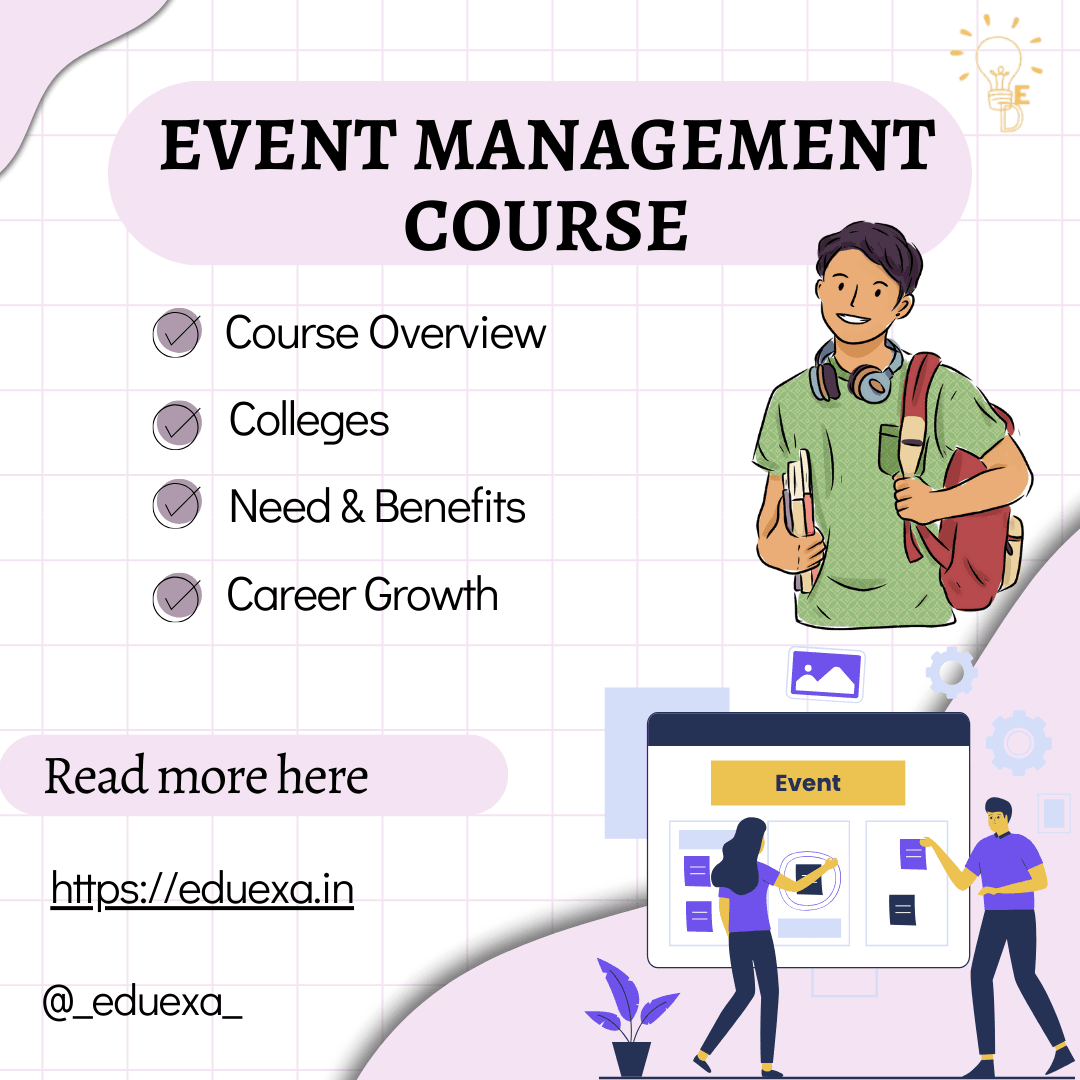Introduction
The event management industry is a dynamic and ever-evolving sector that encompasses the planning, organization, and execution of a wide range of events, from large-scale conferences and festivals to intimate weddings and corporate meetings. It involves a complex interplay of various elements, including venue sourcing, vendor management, logistics, budgeting, marketing, and risk management, all aimed at delivering a seamless and impactful experience for attendees.
Need for Event Management Course
- Increasing emphasis on experiential marketing: Businesses are increasingly recognizing the power of live events to connect with customers on an emotional level and create lasting memories. This has led to a rise in demand for events that are not only informative but also engaging and interactive.
- The rise of virtual and hybrid events: The COVID-19 pandemic accelerated the adoption of virtual and hybrid event formats, which offer greater flexibility and reach to a wider audience. This has opened up new opportunities for event management companies to expand their service offerings and cater to a more global clientele.
- Evolving technology: Technological advancements are constantly transforming the event management landscape. Event management platforms, data analytics tools, and virtual reality applications are just a few examples of how technology is enabling event planners to create more immersive and personalized experiences.
- Growing demand for corporate events: Companies are increasingly using events to launch new products, celebrate milestones, and boost employee morale. This has led to a steady increase in the demand for corporate event management services.
The event management industry is expected to continue its growth trajectory in the coming years, driven by these and other factors. Event management professionals who can stay ahead of the curve and adapt to new trends will be well-positioned to capitalize on the vast opportunities in this exciting field.
Read a Complete Guide on Digital Marketing Here.
Benefits of Event Management Course
Taking an event management course can offer a multitude of benefits, both career-specific and personally enriching. Here are some key highlights:
Career Advancement:
- Gain Relevant Skills: You’ll master crucial skills like project management, budgeting, logistics, marketing, communication, negotiation, and vendor management, all highly sought-after in the industry.
- Boost Your Resume: A recognized qualification enhances your resume, demonstrating your commitment and knowledge to potential employers.
- Network and Build Connections: Courses often provide opportunities to connect with industry professionals, opening doors to internships, job opportunities, and valuable mentorships.
- Specialize and Stand Out: Choose courses focused on specific event types like festivals, conferences, or weddings, carving a niche in a competitive market.
Personal Development:
- Enhance Transferable Skills: The skills you learn are valuable beyond event management, including problem-solving, teamwork, adaptability, and time management, benefiting you in any career path.
- Boost Confidence and Creativity: Planning and executing successful events fosters confidence and allows you to unleash your creative potential.
- Gain Industry Knowledge: Dive deep into the latest trends, technologies, and regulations shaping the event landscape, making you a well-informed professional.
- Network with Like-Minded Individuals: Connect with peers and potential collaborators, building a supportive network within the industry.
Additional Advantages:
- Flexibility: Choose from online, part-time, or full-time courses depending on your schedule and needs.
- Career Change: If you’re seeking a career switch, an event management course provides a structured pathway to enter this exciting field.
- Personal Fulfillment: Planning and executing impactful events can be incredibly rewarding, offering a sense of accomplishment and satisfaction.
Whether you’re aiming for a career change, want to advance in the industry, or simply enjoy organizing events, an event management course can equip you with the knowledge, skills, and connections to succeed.
What is Event Management?
Event management is the art and science of planning, organizing, and executing a wide range of events, from intimate gatherings to large-scale productions. It involves meticulously coordinating various aspects like venue selection, vendor management, logistics, budgeting, marketing, risk management, and much more – all aimed at delivering a seamless and impactful experience for participants.
Key Components of Event Management:
- Planning: This is the foundation, encompassing defining goals, target audience, theme, budget, timeline, and activities.
- Logistics: Managing the nitty-gritty details like transportation, accommodation, equipment rentals, security, permits, and contingency plans.
- Budgeting: Creating a realistic financial plan, securing funding, tracking expenses, and managing cash flow.
- Marketing: Promoting the event effectively through targeted campaigns, press releases, social media, and other channels.
- Technology: Utilizing event management software, registration platforms, data analytics, and other tech tools to streamline processes and enhance experiences.expand_more
- Vendor Management: Collaborating effectively with caterers, decorators, entertainment providers, audiovisual companies, and other vendors to ensure smooth execution.
- Evaluation: Measuring the event’s success against goals, collecting feedback, and analyzing data to improve future endeavors.
Types of Events Managed by Professionals:
The diversity of events professionals manage is vast, including:
- Corporate Events: Conferences, seminars, product launches, team-building activities, award ceremonies, and shareholder meetings.
- Social Events: Weddings, birthday parties, graduations, anniversaries, galas, and fundraisers.
- Entertainment Events: Concerts, festivals, theatrical productions, sporting events, and trade shows.
- Government Events: Political rallies, public hearings, community festivals, and cultural celebrations.
- Virtual Events: Webinars, online conferences, live-streamed concerts, and hybrid events combining virtual and physical elements.
Skills for Success in Event Management:
- Organization: Juggling multiple tasks, timelines, and resources effectively.expand_more
- Communication: Clearly conveying ideas, collaborating with diverse stakeholders, and managing expectations.
- Problem-Solving: Anticipating and resolving challenges with flexibility and resourcefulness.
- Creativity: Designing unique and engaging experiences that resonate with the target audience.
- Negotiation: Securing favorable deals with vendors and managing contracts effectively.
- Attention to Detail: Meticulously planning and overseeing every aspect of the event to ensure its smooth execution.expand_more
- Time Management: Prioritizing tasks, meeting deadlines, and working efficiently under pressure.
- Leadership: Motivating and guiding teams to achieve shared goals.
By mastering these skills and gaining relevant experience, event management professionals can orchestrate memorable and impactful events that leave a lasting impression.
Why Invest in an Event Management Course?
Launching yourself into the dynamic world of event management can be incredibly rewarding, but navigating the intricacies requires the right preparation. An event management course provides a structured learning environment designed to equip you with the knowledge, skills, and industry insights needed to succeed.
Building the Skillset for Event Success:
- Master the Fundamentals: Gain a comprehensive understanding of core concepts like planning, logistics, budgeting, marketing, risk management, and legal considerations.
- Develop Practical Expertise: Engage in hands-on exercises like creating event proposals, negotiating contracts, and managing event budgets.
- Sharpen Industry Know-How: Learn from experienced instructors and guest speakers who share their real-world expertise and practical tips.
- Explore Diverse Event Types: Gain insights into various event formats like conferences, weddings, festivals, and virtual events, identifying your niche.
- Hone Soft Skills: Enhance your communication, teamwork, problem-solving, and leadership skills through collaborative projects and group discussions.
Course Components that Foster Growth:
- Practical Exercises: Experiment with different event planning tools, software, and techniques, gaining hands-on experience.
- Case Studies and Real-World Scenarios: Analyze successful and unsuccessful events, learning from both triumphs and challenges.
- Industry Guest Speakers: Gain valuable insights from seasoned professionals and get a glimpse into the current job market.
- Networking Opportunities: Connect with classmates, instructors, and industry professionals, building your professional network.
- Career Guidance and Mentorship: Receive personalized advice on career paths, resumes, and interview skills.
Structured Learning versus Self-Teaching:
While self-learning resources exist, a structured course offers several advantages:
- Comprehensive Curriculum: Covers all essential aspects of event management in a logical sequence.
- Expert Guidance: Instructors provide feedback, answer questions, and offer personalized support.
- Structured Learning Environment: Promotes discipline, time management, and focused study.
- Networking Opportunities: Connects you with like-minded individuals and potential collaborators.
- Credibility and Recognition: A recognized qualification enhances your resume and demonstrates commitment to the field.
Investing in an event management course equips you with the knowledge, skills, and network to navigate this exciting career path with confidence. It’s a structured roadmap towards success, paving the way for you to create unforgettable experiences and leave your mark on the world of events.
Embarking on your Event Management Journey: Course Structure and Assessment
Venturing into the world of event management through a dedicated course promises an enriching experience. Let’s explore what you can expect in terms of structure, curriculum, and assessment methods:
Course Structure:
- Modules: Most courses are divided into modules focusing on specific topics like event planning, logistics, marketing, budgeting, and legal aspects.
- Delivery modes: Courses can be offered in various formats, including full-time, part-time, online, or blended (combining online and in-person sessions).
- Duration: Depending on the chosen format and intensity, courses can range from a few weeks to several months or even a year.
Curriculum Highlights:
- Planning and execution: Learn all about defining event goals, target audience, timeline, activities, and logistics.
- Financial management: Master budgeting, securing funding, cost control, and financial reporting.
- Marketing and promotion: Explore effective marketing strategies, communication channels, and audience engagement techniques.
- Risk management: Understand safety protocols, crisis management plans, and contingency planning.
- Technology integration: Leverage event management software, registration platforms, data analytics, and other digital tools.
- Legal considerations: Learn about contracts, permits, insurance, intellectual property, and data privacy regulations.
- Event types and trends: Gain insights into diverse events like conferences, weddings, festivals, and virtual formats.
- Industry guest speakers: Benefit from the expertise and practical advice of seasoned professionals.
Assessment Methods:
- Assignments: Case studies, research papers, event proposals, budgeting exercises, marketing plans, and project reports are common forms of assessment.
- Exams: Written tests assess your theoretical knowledge and understanding of key concepts.
- Presentations: You might be required to present your work or defend your event proposals in front of peers and instructors.
- Projects: Group or individual projects simulating real-world event planning and execution provide practical experience and demonstrate your skills.
- Participation: Active participation in class discussions, workshops, and group activities is often evaluated.
Remember: The specific structure, curriculum, and assessment methods can vary depending on the institution, course level, and format.
By diligently engaging with the course content, actively participating, and utilizing the feedback you receive, you’ll be well on your way to mastering the art and science of event management and carving your path in this dynamic field.
Charting Your Course to Event Management Success: Benefits and Outcomes
An event management course serves as your launchpad, propelling you towards your career aspirations in this exciting field. Let’s delve into the key benefits and potential outcomes:
Achieving Career Goals:
- Gain a Competitive Edge: Stand out from the crowd with a recognized qualification and demonstrably relevant skills.
- Network and Build Connections: Create valuable connections with peers, instructors, and industry professionals, opening doors to opportunities.
- Develop a Portfolio: Showcase your practical skills and projects, highlighting your capabilities to potential employers.
- Gain Industry Insights: Navigate the complex landscape with confidence, armed with the latest trends and best practices.
- Explore Career Paths: Identify your niche within the diverse event industry, aligning your interests with suitable roles.
Career Opportunities and Paths:
- Event Coordinator: Plan, execute, and manage various events, ensuring smooth operations.
- Event Marketing Manager: Craft and implement effective marketing strategies to attract and engage audiences.
- Meeting and Conference Planner: Organize corporate events, conferences, and trade shows.
- Wedding Planner: Assist couples in creating their dream wedding experiences.
- Festival Organizer: Manage large-scale festivals, ensuring logistics, entertainment, and attendee safety.
- Event Production Manager: Oversee the technical aspects of events, including staging, audio-visual, and lighting.
- Freelance Event Management: Manage client events independently, fostering entrepreneurial skills.
Transferable Skills for Versatile Success:
- Organization and Time Management: Juggle multiple tasks and deadlines effectively, a valuable asset in any industry.
- Communication and Teamwork: Collaborate seamlessly with diverse stakeholders, both verbal and written communication skills are highly sought-after.
- Problem-Solving and Adaptability: Think on your feet and resolve challenges with resourcefulness, a crucial skill in dynamic environments.
- Financial Management and Budgeting: Manage finances responsibly, a valuable skill across various business functions.
- Negotiation and Persuasion: Secure favorable deals with vendors and partners, a skill applicable in sales, marketing, and other fields.
- Creativity and Innovation: Think outside the box and develop unique event concepts, fostering innovation in any work environment.
By investing in an event management course, you’ll not only be equipped with industry-specific knowledge and skills but also develop valuable transferable competencies that set you up for success in diverse career paths. You’ll be prepared to orchestrate unforgettable events, connect with people, and leave your mark on the world, one experience at a time.
Is Event Management Calling Your Name? Here’s Who Should Consider the Course:
The world of event management is a vibrant tapestry woven with diverse personalities and backgrounds. Here’s a glimpse into who might find themselves drawn to its captivating threads:
Dreamers and Doers:
- Creative Visionaries: Do you envision magical weddings, electrifying concerts, or impactful conferences? You crave to translate ideas into reality, leaving a lasting impression.
- Logistics Wizards: You thrive on organization, keeping timelines and budgets in check. The intricate puzzle of planning excites you, and efficiency is your middle name.
- People Connectors: You see the magic in bringing people together. Building communities, fostering connections, and witnessing shared experiences energize you.
Career Changers and Seekers:
- Restless Spirits: You yearn for a dynamic career filled with variety and new challenges. The routine humdrum doesn’t resonate, and event management’s diverse landscape beckons.
- Entrepreneurial Thinkers: The freedom and flexibility of freelance event management sparks your ambition. You see challenges as opportunities and crave building your own success story.
- Hospitality Mavericks: Your passion lies in exceeding expectations and creating memorable moments. You have a knack for service and thrive in fast-paced, guest-centric environments.
Upskillers and Lifelong Learners:
- Event Enthusiasts: You volunteer at festivals, organize family gatherings, or simply marvel at the seamless execution of large-scale events. You desire to deepen your knowledge and refine your skills.
- Career Climbers: You’re already in the industry, but seek advancement. The course equips you with the latest trends, industry insights, and a recognized qualification to propel your career forward.
- Personal Growth Seekers: You value acquiring new skills, expanding your network, and pushing yourself outside your comfort zone. The course offers a stimulating learning experience and personal development opportunities.
Event management is not just a career; it’s a community of passionate individuals who create moments that matter. If you see yourself reflected in these descriptions, or simply have a spark of curiosity, consider taking the first step. An event management course might just unlock your hidden potential and lead you on an unforgettable journey!
Best Event Management Colleges in India?
1. Xavier Institute of Communications, (Mumbai)
2. Amity School of Communication, (Noida)
3. National Institute of Event Management, (Mumbai, Pune, Ahmedabad)
4. NAEMD Institute, (Mumbai, Ahmedabad, Jaipur, Noida)
5. Institute of Mass Communication Film & Television Studies (Kolkata)
Note: These are not official rankings from any reports, It’s based on Student’s feedback, placements and our personal Research and Assessment.
Event Management Course Fees
Fees for Event Management Course varies from College to Colleges, Ideally the Average fees for Event Management Course is INR 1,25,000 to 5,00,000. Also it depends on weather you are doing a Diplomatic Course or a Degree Course.
Frequently Asked Questions (FAQ)s:
- What are the different types of event management courses available?
- There are certificate programs, diploma programs, undergraduate degrees, and postgraduate degrees available. They vary in length, intensity, and focus.
- Event Management Course Fees?
- Fees for Event Management Course varies from College to Colleges, Ideally the Average fees for Event Management Course is INR 1,25,000 to 5,00,000.
- What are the prerequisites for taking an event management course?
- Most courses require a high school diploma or equivalent. Some may require specific math or business courses.
- How much does an event management course cost?
- The cost varies depending on the program, institution, and location. Costs can range from a few hundred dollars to tens of thousands of dollars.
- Is there financial aid available for event management courses?
- Yes, some institutions offer scholarships, grants, and loans to help students pay for their education.
- What are the key topics covered in an event management course?
- Common topics include event planning, logistics, budgeting, marketing, risk management, technology, legal aspects, and specific event types.
- What skills will I learn in an event management course?
- You will develop skills in organization, communication, teamwork, problem-solving, negotiation, leadership, and creativity.
- Do I need any prior experience in event management to take a course?
- Not necessarily. Some courses are designed for beginners, while others may require some experience.
- What are the job prospects for event management graduates?
- The job outlook for event management is generally positive. With the increasing demand for events, skilled event management professionals are in high demand.
- What types of jobs can I get with an event management degree?
- There are many different career paths available, including event coordinator, meeting planner, wedding planner, festival organizer, and event marketing manager.
- What is the average salary for event management professionals?
- The average salary varies depending on experience, location, and specific job title. Entry-level positions typically start around $30,000 per year, while experienced professionals can earn upwards of $100,000 per year.



